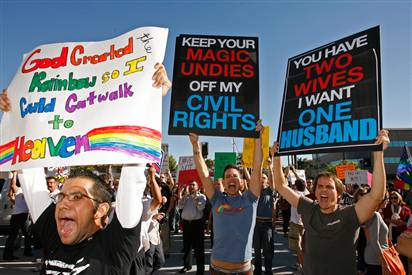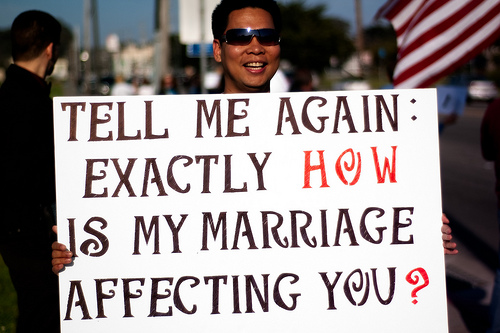
Note: This is the second part of this essay. Part one can be found by clicking here.
“It was just him and me. He fought with honor. If it weren’t for his honor, he and the others would have beaten me together. They might have killed me, then. His sense of honor saved my life. I didn’t fight with honor… I fought to win.”
–Ender’s Game
“Somebody with that much compassion could never be the killer we needed. Could never go into battle willing to win at all costs. If you knew, you couldn’t do it. If you were the kind of person who would do it even if you knew, you could never have understood [them] well enough.”
—Ender’s Game
Perhaps one of the most troubling things to me about the whole Ender’s Game boycott is the chill and fear it creates not only for those who, on personal, religious or ethical grounds, oppose gay marriage, but also to those who choose to work and associate with them. In these scenarios, all tainted parties are punished, even those who happen to be supportive with the gay rights movement. It’s a modern McCarthyism, creating a feeling that all people who do not pass that sociopolitical litmus test must be shunned and, if you do not shun them as well, you’re suspect as well. Thus, in the case Ender’s Game, Lionsgate, Harrison Ford, Gavin Hood, Asa Butterfield, and the rest of the cast and crew of the film would be punished by this kind of attitude, even though they have all come out staunchly in the favor of gay rights, and insist the story of Ender’s Game is a story about compassion and empathy, so has nothing to do with Card’s stance on gay marriage.
Fortunately, a lot of the more level headed members of the liberal community see the implications of such actions. Juliet Lapados at the New York Times, even though she hardly agrees with Card’s more extreme views, called out this sort of action:
Generally, boycotts are used to pressure companies or governments to end objectionable activities; consider the boycott of Chick-fil-A to protest the chain’s financial support of antigay organizations. What Geeks Out has in mind is closer to blacklisting. The group wants to “send a clear and serious message to Card and those that do business with his brand of antigay activism — whatever he’s selling, we’re not buying.” This isn’t about stopping the dissemination of antigay sentiments; it’s about isolating Mr. Card and shaming his business partners, thus cutting into their profits.
If Mr. Card belongs in quarantine, who’s next?


